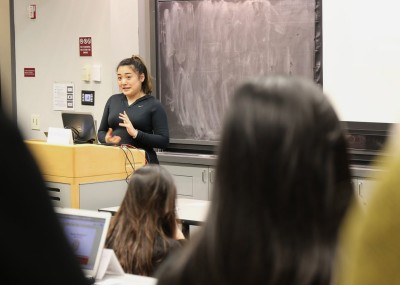
A constitutional amendment was proposed to the Boston University Student Government Senate in its meeting Monday that consisted of cutting automatically allotted senator seats in favor of adding 25 at-large seats that any student group can run for. The amendment will be further debated and voted on during the next Senate meeting.
Hamilton Millwee, an SG director of academic affairs, proposed the amendment to the Judicial Commission and Senate. During his presentation, Millwee, a junior in the College of Arts and Sciences, said the current system allows some students to have more Senate representation than others, and this amendment would allow all student groups an equal opportunity to be proportionately represented in Senate.
For example, a student who is enrolled in CAS, lives in Warren Towers and joins a fraternity can be represented by up to nine different senators, Millwee explained. However, a student in the School of Hospitality Administration that lives off campus has just one senator for representation. The amended Constitution would then ensure that each student is represented by three senators, Millwee said.
Brian Butler, a judicial commissioner and a freshman in the College of Engineering, said after the meeting that the Judicial Commission chose to support this amendment because the Senate needs to be more representative of the student body.
Jeremy Singer, a junior in the Questrom School of Business and a senator for 10 Buick St., said a better solution to this problem would be to add the at-large seats to the current Senate instead of eliminating current Senate positions.
“Eliminating positions of certain groups [currently represented in SG] that have a small representation on campus may be [putting them] at risk for not finding enough voting representation,” Singer said during the meeting.
Lucas Radoccia, a sophomore in Questrom and a senator for the Interfraternity Council, said if everyone at BU were to vote for who they want as senators, the amendment would be a good idea. However, he said the amendment wouldn’t work at BU because only a small portion of the student body votes during general elections.
“Logistically, true representation of our student body will not come about by adding 25 new elected positions,” Radoccia said during the meeting. “No matter which way you look at it, this amendment is incredibly optimistic, and it really should work that way. But here at BU, I don’t believe it will.”
SG President Andrew Cho said after the meeting that he appreciated the senators’ debate on the amendments and that this amendment isn’t perfect, but it is better than not changing the current system.
“The senators really stepped up their analysis and … their opinions,” said Cho, a senior in CAS. “I wanted to make sure that people know that where we are now is imperfect to the point of a fault because it has caused issues, and people are calling for it to change.”
Senate Chair Courtney Bold said after the meeting that she is looking forward to seeing how senators will vote during the next meeting.
“I’m really excited to see senators debate this amendment next week,” said Bold, a senior in Questrom. “It’s a large structural change to the way we operate right now, and I am glad that it’s getting the discussion. I’m glad we spent a lot of time on it today, because it is very important.”
After the meeting, several senators said they had mixed feelings regarding the amendment to restructure Senate.
Alexandria Perry, a freshman in CAS and a CAS senator, said she is worried by the number of at-large senators.
“Specifically for CAS senators, I know we’re concerned with overrepresentation, but hopefully they can come to some sort of compromise and perhaps decrease the number of seats from 25 to something more like 15 or 10,” Perry said.
Joshua Smith-Sreen, a freshman in CAS and a senator for the Kilachand Hall, said this amendment is not the perfect solution to the problem, but he hopes Senate continues to debate this issue.
“I appreciate where the amendment is coming from, and it is probably the best alternative we have right now to better represent our constituencies and to get more of an equal voting opportunity for the student body,” Smith-Sreen said. “I hope … we move forward with the proposal next week. But we’ll have to see.”


















































































































